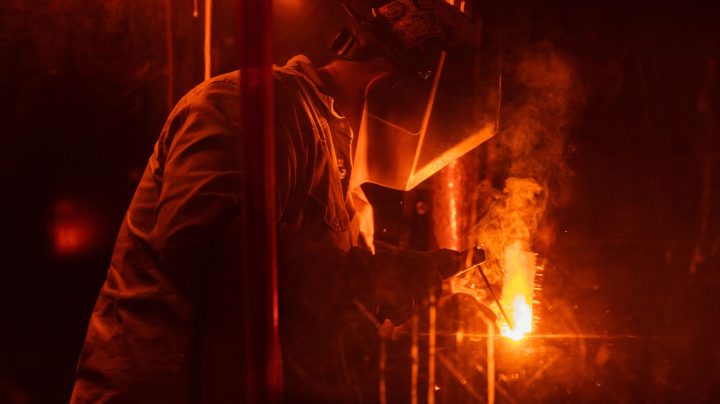
Labor is “unbelievably hard to find,” steel company president says
Labor is “unbelievably hard to find,” steel company president says

Manufacturing has a labor shortage, with “more unfilled job openings than unemployed workers with experience,” according to the U.S. Chamber of Commerce. The industry lost 1.4 million jobs during the pandemic.
“In manufacturing, labor is unbelievably hard to find,” said Lisa Goldenberg, president of Delaware Steel Co., someone we check in with occasionally about the state of the industry.
Goldenberg told Marketplace host Kai Ryssdal that the country needs to invest in training young people to solve the labor shortage.
“If we don’t start working with our youth and offering role modeling, vocational training, corporate leadership, as a society, what are we doing with our kids? … If you don’t graduate with the ability to earn a living and pay the bills, as a society, what are we doing with our kids?”
The following is an edited transcript of the conversation.
Kai Ryssdal: How are things in the world of steel?
Lisa Goldenberg: Actually, they’re doing remarkably well. And I say that because the fourth quarter was kind of dismal. We got our butts handed to us. And I’m glad we didn’t talk then because I never want to be too sad. So I can get to be a little more optimistic today.
Ryssdal: I’m sorry to chuckle, but what happened in the fourth quarter? And how did it turn around?
Goldenberg: I think that manufacturing really slowed down. I think there was a lot of fear of this theoretical recession that we have yet to see. And I think that the increase in interest rates caused a strong pause, as well as some other kind of international factors. I think that we turned the corner, we come back for the new year. And it’s like, “Hey, there’s a lot going on.” Consumer spending is still up, people need a lot of what I say, quote-unquote, stuff, all the things that steel makes, and manufacturers and manufacturing numbers continue to look very strong.
Ryssdal: OK, so you’re optimistic now. If I call you in, not 90 days, that’s too short. But if I call you in six months, right, because we —
Goldenberg: Don’t talk about six months, Kai, because now I start to get worried. July, everyone has this sort of question mark of what the second half of the year is going to look like. And there’s some seasonal slowdown that occurs anyway in the summer months and vacation. And I am concerned for the fourth quarter. I don’t think it’s going to be some deep recession that everyone’s worried about. But for example, in steel, there’s been a 62% increase in pricing in the last four months. I think that if we haven’t seen the peak, we’re going to see in the next 60 days, for sure.
Ryssdal: Interesting. All right, so a couple of specific things: I don’t know if you’re thinking about hiring, but if you are, could you? Is labor an issue for you?
Goldenberg: I’m not thinking of hiring right now, only because my needs aren’t going to be met in that way for my growth strategies.
Ryssdal: Wait, hold on. So how do you grow? How do you grow and not hire people? Help me understand that.
Goldenberg: Well, some of it’s sales driven and a lot of it’s remote and virtual outside reps — it’s sort of a different model. But in manufacturing, labor is unbelievably hard to find. And some of it is the things that you tend to hear about in the press of increasing the minimum wage and having it be too expensive and health care costs. And for sure, all those things are true. However, I think it’s a much deeper, more serious issue in there just isn’t labor. If we don’t start working with our youth and offering role modeling, vocational training, corporate leadership, as a society, what are we doing with our kids? You’re just doomed, and then you end up having to pay for it anyway. So we might as well pay for when they’re a lot younger and more hopeful and, frankly, more impressionable to the value of paying the bills.
Ryssdal: Last thing, and then I’ll let you get back to running your company. One of the reasons we talk to you, and honestly, one of the great parts about our conversations I think, is the reality check that you always get, right? You don’t horse around. What’s your gut on this economy right now?
Goldenberg: My gut is that it’s a lot stronger than people want to acknowledge. I think that how you feel about the economy and how you feel about your day-to-day life has gotten to be, instead of reality and like gut checking and what it really is, it’s gotten to be a political statement. At the end of the day, while many, many, many people are struggling, things are pretty good. Could they be better? Absolutely. Do we need certain policies in place? Absolutely. Does the Fed need to be kept in check? And do I worry about interest rates? Of course. But overall, geez, things are pretty good.
There’s a lot happening in the world. Through it all, Marketplace is here for you.
You rely on Marketplace to break down the world’s events and tell you how it affects you in a fact-based, approachable way. We rely on your financial support to keep making that possible.
Your donation today powers the independent journalism that you rely on. For just $5/month, you can help sustain Marketplace so we can keep reporting on the things that matter to you.











